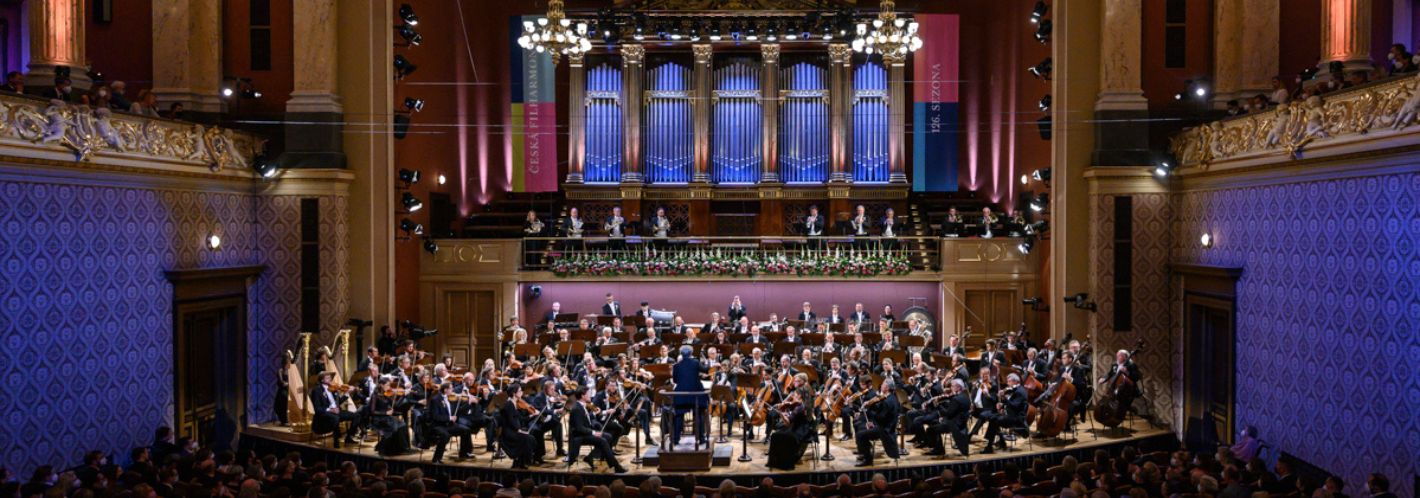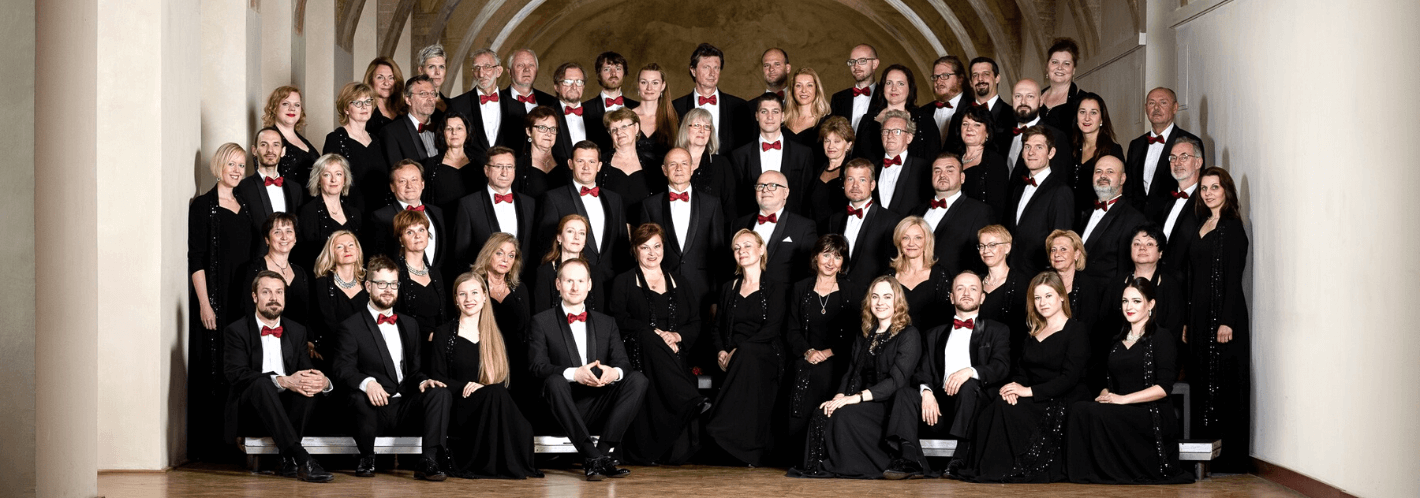
Antonín Dvořák: Saint Ludmila, Op. 71, B. 144
This year’s performance of Dvořák’s oratorio, Saint Ludmila, at St Vitus’s Cathedral will be an indispensable part of the commemoration of the 1,100th anniversary of Ludmila’s death on 15 September 921, when she was murdered at Tetín Castle. Ludmila and her grandson, Saint Wenceslas, are two of the most important Czech saints. Saint Ludmila was the wife of Bořivoj, Duke of Bohemia, and she played a key role in the conversion of the Přemyslid dynasty to Christianity. In the monumental oratorio, Dvořák and his librettist Jaroslav Vrchlický depict the destruction of pagan idols, the marriage of Ludmila to the first historically documented Přemyslid ruler, and the sacrament of baptism performed on them in Velehrad by Bishop Methodius. The Czech Philharmonic will join forces with the Prague Philharmonic Choir at St Vitus’s Cathedral, bringing together the top ensembles in the world of Czech music as a contribution to the dignified veneration of St Ludmila, for whom Mass will also be celebrated that afternoon, by Cardinal Dominik Duka at St George’s Basilica. The concert is a part of a week-long celebration, which culminates at Tetín. And one could scarcely imagine these celebrations without a performance of the most important work for vocal forces and orchestra devoted to this subject matter.
Gramophone’s 2024 ‘Orchestra of the Year’, the Czech Philharmonic gave its first concert – an all-Dvořák programme conducted by the composer himself – in the famed Rudolfinum Hall on 4 January 1896. The Orchestra is acknowledged for its definitive interpretations of Czech composers and recognised for its special relationship with the music of Brahms, Tchaikovsky, and Mahler, who conducted the world première of his Symphony No. 7 with the Orchestra in 1908. It is currently recording the complete cycle of Mahler symphonies with Chief Conductor and Music Director Semyon Bychkov for Pentatone.
The Czech Philharmonic’s extraordinary and proud history reflects both its location at the very heart of Europe and the Czech Republic’s turbulent political history, for which Smetana’s Má vlast has become a potent symbol. 2024 was the Year of Czech Music, a major celebration launched on the bicentenary of Smetana’s birth and held across the Czech Republic every ten years. The Czech Philharmonic marked Smetana’s bicentenary with a series of concerts at the Smetana Litomyšl Festival, including a rare concert performance of his opera Libuše, conducted by Principal Guest Conductor Jakub Hrůša.
The contribution of the Czech Philharmonic and Semyon Bychkov to the Year of Czech Music was the Dvořák Festival, a combined performance of three overtures, instrumental concerts, and the last three symphonies of Antonín Dvořák, both in Prague and on tour in South Korea, Japan, Spain, Austria, Germany, Belgium, and France. The highlight of the Year of Czech Music performed by Semyon Bychkov and the Czech Philharmonic was a series of three concerts in New York's Carnegie Hall.
Alongside the Czech Philharmonic’s Youth Orchestra, Orchestral Academy, and Jiří Bělohlávek Prize for young musicians, a comprehensive education strategy engages with more than 400 schools, bringing students of all ages to the Rudolfinum – some travelling as long as four hours – to hear concerts and participate in workshops. An inspirational music and song programme led by singer Ida Kelarová for the extensive Romani communities within the Czech Republic and Slovakia has helped many socially excluded families to find a voice.
An early champion of the music of Martinů and Janáček, the works of Czech composers – both established and new – remain the lifeblood of the Orchestra. Instigated by Semyon Bychkov at the start of his tenure, nine Czech composers and five international composers – Detlev Glanert, Julian Anderson, Thomas Larcher, Bryce Dessner, and Thierry Escaich – were commissioned to write for the Orchestra.
source: Česká filharmonie

Petr Altrichter made his debut with the Czech Philharmonic in 1979, and has subsequently conducted the Orchestra on numerous occasions in Prague, on tour in China, Germany, in Japan and Taiwan.
He was raised in a musical family, and he played musical instruments from a young age. Having graduated from the conservatory in Ostrava as a French horn player and conductor, he continued his studies at the Janáček Academy of the Performing Arts in Brno in the fields of orchestral conducting under the guidance of Otakar Trhlík and František Jílek and choral conducting with the teachers Josef Veselka and Lubomír Mátl. After his studies in Brno, he worked as a choirmaster and conductor with the Brno Academic Choir, and he played a part in the earning of many prizes at foreign choral competitions and festivals (Middlesbrough, Debrecen…).
Altrichter attracted international attention in 1976, when he earned the title of laureate and a special prize from the jury at the renowned conducting competition in Besançon, France. On the basis of that prize, he became Václav Neumann’s assistant conductor with the Czech Philharmonic, and he started his own artistic career. Not long after that, he began to receive invitations to conduct orchestras abroad.
After a period of activity with the Brno Philharmonic, in 1988 he became a conductor of the Prague Symphony Orchestra, and in 1990 he became its principal conductor. With that orchestra, he made frequent foreign tours to Japan, the USA, Switzerland, Germany, France, and other countries. At the same time, he was engaged in long-term collaboration with the Czech Chamber Philharmonic Orchestra in Pardubice, with which he often gave performances abroad introducing many gifted young soloists (such as Isabelle van Keulen and Radek Baborák) who are now firmly established on concert stages around the world.
From 1993, he was the music director of the Southwest German Philharmonic Orchestra of Constance, with which he gave concerts regularly at the Tonhalle in Zurich and at the KKL in Lucerne, and he also toured Switzerland and Italy.
Petr Altrichter made his debut in the United Kingdom with the Prague Symphony Orchestra at the Edinburgh Festival in 1993, and his London debut with the English Chamber Orchestra followed soon thereafter. In 1997 he was appointed as the principal conductor of the Royal Liverpool Philharmonic after having guest conducted the orchestra with great success during the previous season. He also made an appearance with that orchestra in 2000 at the BBC Proms at London’s Royal Albert Hall, and he made a number of highly acclaimed recordings for the orchestra’s own label – RLPO Live.
In 2001 Altrichter was invited to take the helm of the Brno Philharmonic, and he remained there for seven years, returning to the orchestra with which he had been associated since his student days, and he still continues to guest conduct there regularly.
In 2015 he toured Germany with the Czech Philharmonic, and in late 2015 and early 2016, he toured China with the same orchestra. In the spring of 2017 he toured Japan with the Prague Symphony Orchestra, and his 2018 calendar included a tour of the United Kingdom with the Czech National Symphony Orchestra.
He has guest conducted major orchestras abroad, including Japan’s NHK Symphony Orchestra, Berlin Symphony Orchestra, Bruckner Orchestra in Linz, Warsaw Philharmonic, Krakow Philharmonic, Southwest German Radio Symphony Orchestra in Baden-Baden, Latvian National Symphony Orchestra in Riga, Gran Canaria Philharmonic Orchestra, Luxembourg Philharmonic Orchestra, Netherlands Philharmonic, Stavanger Symphony Orchestra, Norrköping Symphony Orchestra, Royal Danish Orchestra in Copenhagen, and Odense Symphony Orchestra. In the United Kingdom he has collaborated with the BBC Symphony Orchestra, the Royal Scottish National Orchestra, the BBC Scottish Symphony Orchestra, and the London Philharmonic Orchestra.
He has made guest appearances at major festivals in Salzburg, Edinburgh, Avignon, Athens, Cheltenham, Paris, Madrid, Chicago, Zurich, Lucerne, Vienne, Seville, Palermo, and elsewhere.
The bulk of Petr Altrichter’s repertoire consists of Czech music – Bedřich Smetana, Antonín Dvořák, Leoš Janáček, and Bohuslav Martinů, Russian music – especially Dmitri Shostakovich, and the works of Gustav Mahler and Anton Bruckner. Important soloists and performers from around the world (Garrick Ohlsson, John Lill, Tabea Zimmermann…) value his flexibility in leading orchestral accompaniments, and they seek out collaboration with him.
Source: Petr Altrichter

The Slovak soprano Eva Hornyáková studied operatic singing at the Košice Conservatory and the Academy of Performing Arts in Bratislava. In 2006 she made her debut at the Slovak National Theatre as Mimi in Puccini’s opera La bohème. In the years that followed, she sang a substantial number of major roles of the opera repertoire on the same stage, including Micaela (Carmen), Pamina (Magic Flute), Donna Elvira (Don Giovanni), Desdemona (Otello), and Marguerite (Faust). Since 2014 she has been performing at the National Theatre in Prague – among other things appearing again in the role of Desdemona, this time alongside star tenor José Cura. She also performs the concert repertoire, appearing in this country and also in Germany, Austria, the Netherlands, and Japan, where her performances include the soprano parts in Dvořák’s Requiem and Stabat Mater, Bruckner’s Te Deum, Janáček’s The Eternal Gospel, and Verdi’s Requiem. At La Scala in 2010 she participated in the finals of Plácido Domingo’s international opera competition, Operalia.
Mezzo-soprano Jana Hrochová is a graduate of the Prague Conservatory. Since 2000 she has been a soloist at the National Theatre in Brno, where her roles have included Carmen, Laura (La Gioconda), Káča (The Devil and Kate), Rosina (The Barber of Seville), Suzuki (Madama Butterfly), Gold-Spur the Fox (The Cunning Little Vixen), Varvara (Káťa Kabanová), and many others. She has also appeared as a guest on numerous Czech stages, including Prague’s National Theatre, as well as in Freiburg, Germany. Her performances have repeatedly earned her the DIVA Prize, awarded by audience members. Her substantial concert activity has included collaborations with top conductors (Jiří Bělohlávek, Serge Baudo, Manfred Honeck, Jakub Hrůša) and orchestras (BBC Symphony Orchestra, Tokyo Metropolitan Symphony Orchestra, Czech Philharmonic). In 2011 she sang the alto solo in Antonín Dvořák’s Requiem at Václav Havel’s state funeral, and from 2011 to 2018 she recorded five CDs of songs by Bohuslav Martinů for the Naxos label. Hrochová made her Proms debut in 2016, accompanied by the BBC Symphony Orchestra at London’s Royal Albert Hall.
Tenor Richard Samek was born in Třebíč and graduated from the Janáček Academy of Performing Arts. In 2006, he made his debut on the stage of the National Theatre in Brno. At present he is a regular guest at the National Theatre in Prague, where his roles include Alfredo (La traviata), Werther (Werther), Tamino (The Magic Flute), and the Prince (Rusalka). He makes guest appearances on a number of stages abroad, including the Grand Théâtre de Reims, the Opéra de Limoges, the Opéra de Rennes, the Theater Magdeburg, and the Semperoper in Dresden. In 2015 he took part in a live recording of Smetana’s opera Dalibor with the BBC Symphony Orchestra under the baton of Jiří Bělohlávek. He has worked with such outstanding orchestras as the Czech Philharmonic, the Orchestra dell’Accademia Nazionale di Santa Cecilia, and the Tokyo Metropolitan Symphony Orchestra. He appears regularly at international music festivals, including the Prague Spring Festival, the Dvořák Prague Festival, the Seefestspiele Mörbisch, and Smetana’s Litomyšl.
The Slovak bass Gustáv Beláček studied singing at the Academy of Performing Arts in Bratislava under the guidance of Prof. Eva Blahová, and he has also learned from great artists including Ileana Cotrubaș, Carlo Bergonzi, and Helmuth Rilling. His numerous awards include an overall victory at the Antonín Dvořák International Competition in Karlovy Vary (1993) and Italy’s Gabardi Award for performances of Mozart and Rossini (2008). Besides appearing at the Slovak National Theatre, he has also performed on many stages in Europe (Geneva, Brussels, Strasbourg, Paris, Dresden, Düsseldorf, Munich, Verona, Florence, Copenhagen) as well as in the USA, Canada, Japan, Argentina, and Israel. He also devotes himself to the concert repertoire with appearances in London, Amsterdam, and Salzburg. He has worked with great conductors including Sir Charles Mackerras, Jiří Bělohlávek, Charles Dutoit, Mariss Jansons, Kurt Masur, and Seiji Ozawa. He has recorded for the Supraphon, Naxos, Harmonia Mundi, Brilliant Classics, BR-Klassik, and Arthaus labels, among others. He took part in a recording of Dvořák’s Requirem on the Delos label with the conductor Zdeněk Mácal, and it won a Grammy (USA) in 2000.
The Prague Philharmonic Choir (PPC) was founded in 1935 by choirmaster and teacher Jan Kühn. Now in its 91st season, it is the oldest professional choir in the Czech Republic. The choir is celebrated beyond Czech borders, especially for its interpretations of oratorios and cantatas. Lukáš Vasilek has served as Principal Conductor and Artistic Director since 2007, joined by Lukáš Kozubík as the choir’s Second Choirmaster.
Under Lukáš Vasilek’s leadership, the Prague Philharmonic Choir has established a reputation as a highly esteemed performing partner of leading international orchestras. At home, the ensemble collaborates regularly with the Czech Philharmonic and, for its own choral concerts, with the Prague Philharmonia. Internationally, the PPC has worked with ensembles such as the Berlin and Dresden Philharmonic Orchestras, Wiener Symphoniker, NDR Elbphilharmonie Orchestra, and the Hong Kong Philharmonic Orchestra.
The PPC has also gained extensive experience working with the world’s top conductors, including Semyon Bychkov, Jakub Hrůša, and Sir Simon Rattle. The choir regularly appears at the Czech Republic’s most renowned festivals, such as Smetana’s Litomyšl, Prague Spring, Dvořák Prague, and Days of Bohuslav Martinů. Since 2010, the PPC has served as Choir in Residence at the Bregenzer Festspiele.
In its 91st season, the Prague Philharmonic Choir will embark on further exciting collaborations with world-renowned conductors, including Zubin Mehta, Antonio Pappano, and Giovanni Antonini.
Alongside its performances, the PPC engages in numerous educational projects. Every season, it presents a cycle of educational concerts for children, catering to both school groups and families. These programs emphasize fun and active engagement with young listeners. The PPC Choral Academy in Honour of Soňa Červená offers singing students the opportunity to gain hands-on experience in a professional ensemble, participate in large-scale musical projects, and learn from collaborations with leading artists.
The choir’s artistic excellence is further demonstrated through its rich recording archive, which continues to expand each season. The PPC has appeared on releases from PENTATONE, Decca Classics, Sony Classical, and Supraphon. Its recordings have earned numerous international accolades, including awards from Gramophone, BBC Music Magazine, and the prestigious Diapason d’Or de l’Année. The PPC’s very first recording, made in 1952, featured Dvořák’s oratorio Stabat Mater conducted by Václav Talich. Its most recent release, Stravinsky, Janáček, Bartók: Village Stories, explores the magic of folk songs and traditional rituals in the music of three 20th-century masters.
The Prague Philharmonic Choir is a laureate of the 2018 Classic Prague Award for Best Vocal Concert, Czech Television’s Classical Music of the Year Award, and the 2022 Antonín Dvořák Prize for exceptional artistic achievements and the promotion of Czech music. The album Village Stories received the Choc de Classica award in May 2024.
source: Pražský filharmonický sbor

This season marks Lukáš Vasilek’s 18th year as the Principal Conductor and Artistic Director of the Prague Philharmonic Choir (PPC). Whether conducting a cappella repertoire or large-scale cantatas and oratorios with orchestra, Vasilek brings his deep understanding of choral music to every performance. Under his leadership, the PPC regularly collaborates with leading Czech and international orchestras and conductors.
Vasilek has received particular recognition for his outstanding interpretations of the great choral works of Mahler, Dvořák, and Janáček. Notable highlights include Benjamin Britten’s War Requiem, Francis Poulenc’s Stabat Mater, and Arthur Honegger’s Jeanne d’Arc au bûcher. He is also known for his adventurous programming, incorporating jazz and spirituals into the PPC’s repertoire.
Lukáš Vasilek studied conducting at the Academy of Performing Arts in Prague and musicology at Charles University. He occasionally returns to his orchestral conducting roots, working closely with the Prague Philharmonia on their choral concert cycle in collaboration with the PPC, a partnership now in its fourth year. He has also conducted musicians of the Czech Philharmonic and the Kyiv Symphony Orchestra.
Vasilek’s first experience with choral singing came as a member of the Boni Pueri boys’ choir. He later served as choirmaster of the Foerster Chamber Choir and the Prague National Theatre Choir. In 2022, he was a guest conductor for the French ensemble Accentus. In addition to his work with the PPC, he is the founder and conductor of the vocal ensemble Martinů Voices, established in 2010, focusing on chamber choral music from the 19th to 21st centuries. Until recently, he also taught choral conducting at the Academy of Performing Arts.
Lukáš Vasilek’s choral and orchestral work is featured on numerous recordings for Decca Classics and Supraphon. His recent recordings of Bohuslav Martinů’s choral works have earned international acclaim, winning awards from Gramophone, BBC Music Magazine, and Diapason.
source: Pražský filharmonický sbor

St. Vitus Cathedral is the largest and the most important temple in Prague. Apart from religious services the coronations of Czech kings and queens also took place in here. The cathedral is a place of interment of remains of provincial patron saints, sovereigns, noblemen and archbishops.The Bohemian Coronation Jewels are kept in Crown Chamber of st. Wenceslas Chapel.